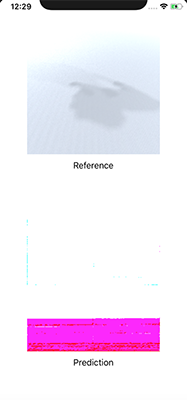I am trying to implement a custom layer in CoreML that solves the Lambda layer that performs ktf.image.resize_images function as a custom layer class in Swift.
This is my Phyton script:
def resizeImage(x, size):
return ktf.image.resize_images(x, size)
def convert_lambda(layer):
if layer.function == resizeImage:
params = NeuralNetwork_pb2.CustomLayerParams()
params.className = "resizeImage"
params.description = "Decoder Resizing"
params.parameters["scale"].intValue = layer.arguments["size"][0].value
print("LAMBDA CONVERSION = Size embedded to CoreML Model: %d" % layer.arguments["size"][0].value)
return params
else:
return None
...
for i in range(decoder_n):
strides = 1
reverse_i = decoder_n - i - 1
size = encoder_layers[decoder_n - i - 1].shape[1:3]
out_channels = 2 ** ((decoder_n - i - 2) // 3 + 5) if i != decoder_n - 1 else 2 ** 5
x = Lambda(resizeImage, arguments={'size':size})(x)
x = Convolution2D(out_channels, kernel_size=(3, 3), activation='relu', strides=strides, padding='same')(x)
x = concatenate([x, encoder_layers[decoder_n - i - 1]], axis=3)
out_channels = 2 ** ((decoder_n - i - 2) // 3 + 5) if i != decoder_n - 1 else channels
activation = 'relu' if i != decoder_n - 1 else 'sigmoid'
x = Convolution2D(out_channels, kernel_size=(3, 3), activation=activation, strides=strides, padding='same')(x)
And so far, this is the Swift class:
import Foundation
import CoreML
import Accelerate
import UIKit
@objc(resizeImage) class resizeImage: NSObject, MLCustomLayer {
let scale: Float
required init(parameters: [String : Any]) throws {
if let scale = parameters["scale"] as? Float {
self.scale = scale
} else {
self.scale = 1.0
}
print(#function, parameters)
super.init()
}
func setWeightData(_ weights: [Data]) throws {
print(#function, weights)
}
func outputShapes(forInputShapes inputShapes: [[NSNumber]]) throws -> [[NSNumber]] {
print(#function, inputShapes)
return inputShapes
}
func evaluate(inputs: [MLMultiArray], outputs: [MLMultiArray]) throws {
print(#function, inputs.count, outputs.count)
for i in 0..<inputs.count {
let input = inputs[i]
let output = outputs[i]
for j in 0..<input.count {
let x = input[j].floatValue
let y = x * self.scale
output[j] = NSNumber(value: y)
}
}
}
}
Any suggestions on why the output predicted image is not encoded correctly?


tf.image.resize_images()resizes the image using bilinear interpolation. But your custom layer appears not to do resizing at all, it just multiplies each pixel with some value. That's a completely different operation... If you're going to be resizing the images by a fixed scale factor at each step (for example, making it twice as large), then I suggest make the Core ML layer anUpsampleLayerParamsinstead. – Loftin